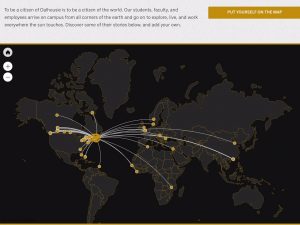“Shine your light and make a positive impact on the world; there is nothing so honorable as helping improve the lives of others.”
Roy T. Bennett

Peggy’s Cove, Nova Scotia
Share.Learn.Inspire.Transform
“Shine your light and make a positive impact on the world; there is nothing so honorable as helping improve the lives of others.”
Roy T. Bennett

Peggy’s Cove, Nova Scotia

Faculty of Management, Dalhousie University
CFAME Connection’s December 1, 2016 post was a look back to the name iterations that occurred since the beginning of the MBA (FS) program almost twenty-two years ago. There was also a nod to the future in a final reminder that names evolve when presented with fresh opportunities.
Many will remember graduating under the banner of “Office of External Graduate Programs.” When the MBA (FS) team joined forces with the MPA(M) and MBA (IT) teams under one roof, a search for a new name began. In March 2005, CFAME – The Centre for Advanced Management Education came into being.
May 2018, CFAME Connection has a new name: CEGE Connection, a reflection of CFAME’s recent name change to The Centre for Executive & Graduate Education. This is an exciting time to consider enrolling in an academic journey. The Centre for Executive & Graduate Education can help you achieve your career goals in a way that is flexible and accommodating to the working professional.
The name, Centre for Executive & Graduate Education, honours the past and adds to a vibrant history that belongs to all graduates.
“Complex situations do not lend themselves to a solution, and it is folly to spend the time, energy, or effort even to attempt to create solutions. Yet this is exactly how the complicated way of thinking works. It is in evidence when companies try to optimize complex activities such as marketing strategy, production schedules based on demand, or long-range planning. This form of thinking is especially evident in economics, as politicians all promise solutions to economic ills.”
Dr. Rick Nason

The children’s game of tic-tac-toe and the adult game of chess are both examples of complicated systems. Tic-tac-toe is a game that can be solved. That is, you can predetermine a precise set of rules that lead to the optimal results each time you play. Theoretically, you can also do the same for chess, although the computer large enough to do so has not been invented yet (and perhaps will never be developed). The number of possible combinations of moves in chess is simply too large for even the most powerful computers to calculate. Thus, the most experienced chess masters only try to anticipate a few moves ahead and play more for position than solving of an optimal problem. It is a “manage, not solve” mentality. Tic-tac-toe and chess illustrate that complicated systems can be either very easy to understand or so complicated that they are virtually unsolvable.
Now consider the game of business. Is business more like tic-tac-toe, in that there are a limited number of moves and combinations, or is business more like chess? The quick answer is that business is more like chess, in that there are an infinite number of combinations that can be played out in any business situation. Furthermore, in business there is the presence of emergence, so the task of “solving” becomes even more impossible. So, if it is not possible to “solve” a game of chess, does it not also make sense that it is not possible to “solve” business problems?
Complex situations do not lend themselves to a solution, and it is folly to spend the time, energy, or effort even to attempt to create solutions. Yet this is exactly how the complicated way of thinking works. It is in evidence when companies try to optimize complex activities such as marketing strategy, production schedules based on demand, or long-range planning. This form of thinking is especially evident in economics, as politicians all promise solutions to economic ills.
When playing chess, you have to play in the moment, based on the actions of your opponent, keeping in mind as well your relative position at any given point in time. It is not possible to plan out all situations, and of course the unexpected can always happen. For instance, your opponent may make a particularly ill-advised move. Perfectly rational planning would imply that such an event could not occur as that would imply that you opponent is stupid and irrational. Any businesses that are run stupidly and irrationally are soon replaced by more astute rivals. Likewise, our opponent can make a particularly spectacular move that you will unexpectedly need to defend against. In chess, you have to manage the situation. A similar strategy also words for business.
The key is to think “manage, not solve.”.
(Excerpt taken from It’s Not Complicated – The Art and Science of Complexity in Business Pages 94 & 95)
Dr. Rick Nason
Associate Professor; Program Director, MBA(FS)
Rowe School of Business
“If you ask me what I came to do in this world, I, an artist, will answer you: I am here to live out loud.”
Émile Zola

Dalhousie University, Nova Scotia

Sylvain Charlebois, Dalhousie University and Tony Robert Walker, Dalhousie University
There are increasing concerns about the use of plastics in our day-to-day lives.
Single-use plastics of any kind, including grocery bags, cutlery, straws, polystyrene and coffee cups, are significant yet preventable sources of plastic land-based and marine pollution.
In Canada, bans on plastics have so far been left up to municipalities, and some are taking action. Both Montreal and Victoria recently decided to ban plastic bags in stores, with business owners subject to huge fines if caught providing these to customers.
Other municipalities and provinces, such as Halifax and Nova Scotia, are contemplating similar bans in the wake of China’s recent ban on the import of certain recyclable products.
Although regulations are cropping up in some places, increasing public awareness appears to be gaining widespread momentum globally and across Canada.
National and regional plastic bag bans have been successfully implemented widely internationally in Asia, Europe, Australia and North America.
But plastic bags are not the only single-use plastic items being targeted —polystyrene is on the hit list as well. Food businesses in Washington, D.C. and San Francisco will no longer be able to use containers or other food service products made of polystyrene.

In Maine, the Brunswick Town Council voted unanimously to ban polystyrene food containers. All retailers, restaurants and vendors are prohibited from using polystyrene foam packaging, including takeout containers, meat trays and egg cartons.
But even though banning single-use plastic using legislative interventions is significant, not everyone is convinced of its effectiveness.
In Canada, some players are taking their own steps using non-legislative strategies to reduce plastic use, regardless of government policy. In 2009, Loblaws, Canada’s largest grocer, implemented a seemingly insignificant five-cent charge on plastic grocery bags.
Loblaws has claimed this unassuming action has diverted billions of plastic bags from our landfills and oceans over the last nine years. In February 2016, Walmart Canada followed suit and began charging customers a five-cent fee for plastic bags across all Walmart stores in Canada.
Public sentiment on climate change and environmental stewardship has changed significantly over just the last few years as more Canadians expect industry to act. But some still have reservations.
Some have claimed that plastic bags serve an important food safety function and protect the public from harmful bacteria, outbreaks and food-borne illnesses, although those findings have been questioned by epidemiologists.
A University of Arizona study in microbiology suggested that the combination of reusable grocery bags and food is risky. According to the study, coliform bacteria and Escherichia coli (E. coli) were found in half of the reusable grocery bags sampled because people were neglecting to launder them often enough.
The study was, however, funded by a trade group representing the interests of plastic bag manufacturers.
The Mercatus Center in the United States, a conservative think tank with Charles Koch on its board, has said that discouraging the use of single-use plastic bags is almost pointless given the insignificant variance in carbon footprint between bagging alternatives, including paper bags.
And data from the U.S. Environmental Protection Agency suggest that because plastic bags are ultra-lightweight by design, they likely make negligible contributions to municipal waste.
These groups appear to be suggesting that banning the use of plastic bags is more about appearances and idealism than about protecting the environment.
Clearly banning plastic bags is a divisive issue. The resistance is real, and several cities have been hesitant to move forward on legislation; some plastic bag legislation has even been rescinded.
Toronto once had a five-cent levy for plastic bags, and an outright ban on plastic bags was sought in 2012, but the ban was rescinded by city council in 2013.
Plastic bags are a convenience, and habits are hard to break. What could potentially be an inconvenience to food shoppers can, and in some cases has, become a political hot potato to those in public office.
But the problem will not go away given the planet is currently drowning in plastic pollution. A study led by the Five Gyres Institute in Los Angeles estimates that at least 5.25 trillion plastic particles weighing 268,940 tonnes are currently floating in our oceans. Even these staggering numbers pale when compared to the estimated eight million tonnes of plastic that enter the oceans each year.

Most of us cannot see the problem, but it is out there. While some trash skimmers capable of removing floating debris in marinas and harbours achieve modest success, a global clean-up is next to impossible with current technology.
The situation is being made worse by countries like Canada. Its food industry continues to generate more waste from single-use plastic food packaging every year.
Given that more than 28 per cent of all households in Canada consist of only one person, and the number of Canadians living alone is going to continue to grow, the single-serve economy will likely expand as well, especially in food.
This means that the use of single-use plastic packaging and containers could increase at alarming rates.
Banning plastics is one swift way to deal with the issue, and offer a temporary path to more impactful, sustainable strategies.
The use of bio-plastics may be the future and could be a convenient solution for all concerned. More and more different feedstocks can be used to manufacture bio-plastics. Algae and shrimp shells are some examples.

To tackle the issue of single-use coffee pods, an increasing number of them sold in Canada are made of coffee shafts and are compostable, but muncipalities say they aren’t yet able to recycle them.
Recently, a Dutch supermarket chain opened the world’s first plastic-free food store. This project was only made possible by using innovative solutions to plastic packaging. You will find only biodegradable flexible bioplastic packaging and bags in the store.
The challenge with these alternatives, of course, is the cost.
Bioplastics are more expensive than regular plastics. But given how rapidly the narrative around climate change is shifting, the “green” premium is increasingly worthy of consideration by industry.
Once supply chains mature and become more developed to allow more access to affordable feedstocks, production costs and end prices for bioplastics will likely drop as well.
The notion of reduce, reuse, recycle has been preached for years now. Outright bans fit well within such a paradigm.
But the concept of replacing single-use plastics requires a revolution in consumer mentality. And so a much more interesting challenge is that of keeping grocery shopping from becoming either a burden on the environment or an inconvenience to customers.
Sylvain Charlebois, Professor in Food Distribution and Policy, Dalhousie University and Tony Robert Walker, Assistant Professor, Dalhousie University
This article was originally published on The Conversation. Read the original article.
Dalhousie’s alumni community, a force of 130,000, spans the world. Our reach is global, but our strength resides in our determination to make a difference within our local neighbourhoods. When we celebrate DAL 200, we honour our story and the stories of fellow students, graduates, professors and support teams. Together, we are committed to seeking positive outcomes for our communities, to explore ways to respond to current challenges and realities, and to work tirelessly to build a resilient society.

“To be a citizen of Dalhousie is to be a citizen of the world. Our students, faculty, and employees arrive on campus from all corners of the earth and go on to explore, live, and work everywhere the sun touches. Discover some of their stories below and add your own.”
As graduates, the years spent within the walls of Dalhousie University continue to influence and nuance our lives in ways we never imagined. Now, we are applying the knowledge acquired during our MBA journey. Please join me in sharing your story at DAL200 Stories.
“Do not go where the path may lead, go instead where there is no path and leave a trail.”
Ralph Waldo Emerson

Martinique Beach, Nova Scotia
A great event today!”
Peter Duinker, Urban Forest Researcher
“It was an amazing morning!”
Marianne Hagen, Alumni & Student Engagement
“I feel like I was doing something positive and helping to give back to our environment. Planting trees is such a good thing to do.”
DAL200 Tree Plant Volunteer

Peter Duinker and the DAL200Trees team
On June 9, 2018, led by urban forest researcher Peter Duinker and the DAL200Trees team, 200 trees were planted across the Studley and Sexton campuses to celebrate DAL’s 200th anniversary and the beginning of the University’s third century. Special thanks to Mike Wilkinson and his Environmental Services team for preparing the selected sites in advance of the tree plant. Students for generations to come will be able to take advantage of these “learning groves.” They are active learning environments where classes can learn to identify native species and observe associations between them.
To see more photos of this amazing event, please access this link: 200 Trees Planting Party

The DAL200Trees Volunteers
“Dahousie’s MBA(FS) was a natural progression in my academic journey, given that I currently work within the financial services industry. I chose the MBA(FS) specifically for its rigorous and hands-on approach to experiential learning. Students acquire practical and relevant skills needed for this sector. Strengthening my quantitative skills, critical analysis and decision-making abilities were true motivators in choosing the Dalhousie MBA(FS).”
Sara Kassim, MPA, Senior Manager, RBC
The phrase, Life-Long Learning, has become a ubiquitous tagline that involves our need to explore new horizons and opportunities. Our curiosity to know what is around the next corner stirs our adventurous spirits.
Adventures, however, are not for the faint of heart, for there is ever the promise of risk, hard work and ambiguity. Applying for an MBA program takes courage and resolve, characteristics that will remain faithful companions on the road ahead.
Sara Kassim, MPA, Senior Manager, Home Equity Financing Acquisition at RBC, chose Dalhousie’s MBA(FS) program to complete a second master’s degree. In a recent virtual interview, Sara shared her vision of life-long learning and why she chose to enroll in this robust academic program.
Sara Kassim
Why did you decide to enroll in the MBA(FS) program?
I have always enjoyed academia (No…nobody is paying me to say that!) Enrolling in my first master’s program in Public Policy and Law kindled my passion and enthusiasm for learning. Graduate studies offered me fresh perspectives and the environment to push the envelope. No idea or theory was too crazy to consider, examine and test.
Dahousie’s MBA(FS) was a natural progression in my academic journey, given that I currently work within the financial services industry. I chose the MBA(FS) specifically for its rigorous and hands-on approach to experiential learning. Students acquire practical and relevant skills needed for this sector. Strengthening my quantitative skills, critical analysis and decision-making abilities were true motivators in choosing the Dalhousie MBA(FS). As I near the end of program, I am confident that the knowledge and experience gained over the past months, will permit me to contribute to the success of my organization.
How has your studies influenced your decision-making? Have you changed how you process information? Are you more strategic?
My studies have improved my strategic thinking capabilities, which facilitates optimum decision-making. Based on both my work experience and learnings from Dalhousie’s MBA(FS), I can quickly identify the risks and corresponding mitigating factors of decisions that need to be made. In this sense, I am more comfortable in taking calculated and prudent risks.
The MBA(FS) increased my capacity to work efficiently, develop and implement the necessary tactics, and most importantly, the aptitude to quickly move from analysis to action (instead of analysis paralysis). I would also say that I live a life of no regrets. My decisions today will be based on current information and discussions with all relevant stakeholders. If my decision changes tomorrow, I do not regret my decision yesterday, as it was based on the most up-to-date information/stakeholder opinions at that time.
How do you keep work-study-life balance?
I maintain focus on what matters; I view things in a macro and micro way, depending on the circumstances. This allows me to remain even-keeled and able to navigate through life in a measured way; my responses align to the level of urgency required.
I am fortunate to have an employer that encourages healthy work/life/balance. They support their employees both through verbal and through actions; they provide opportunities to put learnings to work in the organization to solve everyday business problems. Employees are encouraged to seek personal growth and in so doing, achieve return on investment through career advancement.
When studying, my strategy has been to spend one weeknight and one weekend evening studying and completing assignments. This way, I am not overwhelmed as the time for the intensive and exam approaches. I also like to catch up on my readings during timeslots that do not seem to impact my ‘free time.’ For instance, if I am taking the subway to and from work, I will bring my textbook to catch up on that week’s readings….so if I get 40 min of reading done on the subway, that’s 40 minutes less I am doing at night or on weekends!
Sara Kassim, MPA, Senior Manager, Home Equity Financing Acquisition at RBC, has 12 years of experience within the Royal Bank of Canada. Her interests are innovation in the financial services industry, public finance and accounting, Canadian constitutional & administrative law, ethics-privacy-access to information, equity-policy-law & planning, and public policy analysis. Sara has graciously agreed to be a repeat contributor on CFAME Connection
“Life belongs to the living, and he who lives must be prepared for changes.”
Johann Wolfgang von Goethe

Peggy’s Cove, Nova Scotia